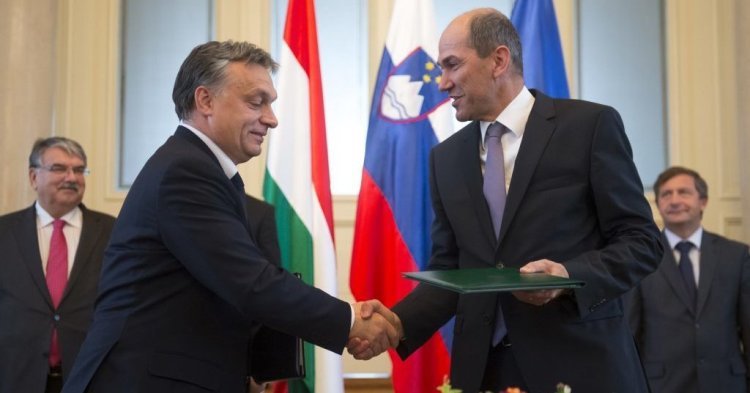Amid an atmosphere of declining voter turnout and loss of interest among Slovenes in politics, 25 parties have submitted their lists of candidates in order to compete in the 3rd early elections the country has had in a row. However, the Slovenian proportional representation electoral system awards seats only to those that reach a 4% national threshold. If recent opinion polls prove to be accurate, that will be achieved by a maximum of 7 or 8 parties only.
Up until late April, opinion polls have been showing an advantage for the Centrist List of Marjan Šarec (LMŠ), the mayor of Kamnik whose bid for the presidency has been narrowly lost to his opponent, incumbent president Borut Pahor, in November of last year. When Šarec announced the intention of his party to run for the first time on the national level following its formation on the local level in 2014, opinion polls placed him as a front-runner ahead of other well-established parties in Slovenia. While this may be surprising to many, it doesn’t appear to be deviating from a historical pattern when put in context.
In 2011, the centrist party Positive Slovenia was founded by Zoran Janković -currently serving as the mayor of Ljubljana- only 2 months prior to the elections. It then went on to win the 2011 elections with 28%. In 2014, a similar scenario was repeated when the Centrist Modern Centre Party (SMC) was founded a month only prior to the elections by the last Prime Minister Miro Cerar, only to again carry the elections with 34% producing 36 seats. Therefore, it won’t be surprising at all if LMŠ does indeed win this election.
However, observers of opinion polls will notice a slight decrease in support for LMŠ coupled with a big jump for Janez Janša’s Liberal-Conservative Slovenian Democratic Party (SDS) placing it as a front-runner and current likely winner of the elections. This has mobilized other parties against him.
Accusing Janša of following the populist path of Victor Orbán, who interestingly visited Slovenia and campaigned for the SDS shoulder to shoulder with Janša on the 11th of May, the Leader of the Liberal Pensioner’s party (DeSUS) Karl Erjavec, which is likely to cross the 4% threshold and reach the parliament, warned against the “Hungarian Model scenario which right-leaning parties want for Slovenia”. His view was joined by other party leaders in the debate held by POP TV on the 21st of May, including the leader of the Center-left Social Democrats (SD) Dejan Židan, and PM Miro Cerar of the Modern Center Party who said referring to Janša’s SDS: “I want to be in the government with parties that support an open and free-thinking Slovenia, not with an extreme that defends populism and scares people”.
One outcome of this election is certain, and that is no party will secure an outright majority on its own, which will inevitably require forming a coalition. While SDS might very well win the elections, Janša will face a tough time building a coalition as most of the parties whose chances of reaching the parliament are almost certain have ruled out cooperating with him, including SD, SMC, DeSUS, leftist Levica, and the Party of former Prime Minister Alenka Bratušek (Stranka Alenke Bratušek).
Even Marjan Šarec who did not previously rule out cooperating with SDS came out on 25th of May on his Twitter account saying that he will not be entering in “a coalition of right-wing parties”. When questioned by a follower whether he will accept taking part in a coalition with SDS and Center-right New Slovenia (NSi) without Janez Janša taking part in the coalition himself, he answered with a straightforward “No”. That leaves possibilities scarce in front of the SDS in case it wins, with only NSi expressing a willingness to enter a coalition with it, which still probably won’t secure a majority as opinion polls have given NSi between 4-7%.
Having said all of that, one must keep in mind that Slovenian polls are not the most reliable. Aside from accusations directed towards them of bias and favoring certain parties, opinion polls have falsely predicted winners in the elections of 2004 (LDS was predicted to win, yet SDS turned out to be the actual winner), 2008 (SDS placed 1st followed by SD in opinion polls, only for the actual results to reverse the order), and 2011 (in a repeat scenario to the 2008 elections, opinion polls placed SDS as the clear winner, yet the elections were won by PS as previously mentioned).
The failure of SDS to win the 2008 and 2011 elections despite its clear lead in opinion polls has been attributed to last-minute voter mobilization against Janša’s party, a scenario which might repeat itself on June 3rd as opinion polls have been showing that as much as 25%-40% of voters are yet to decide which party they would vote for.
The only election since the year 2000 whose results were accurately predicted by opinion polls was the elections of 2014, which brought then newly formed SMC into power. All the above is a clear indication why one should be very cautious when dealing with pre-election Slovenian opinion polls.
If one thing is clear, the results of this election will probably precede a long period of difficult negotiations and uncertainty to form the government which will steer the direction of the country in the next few years, and will be tasked with multiple jobs including restoring the trust of the people, especially young Slovenes, in politics.


Follow the comments: |
|
